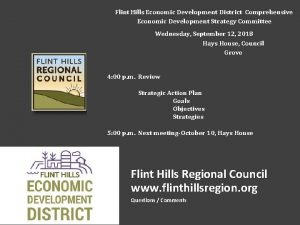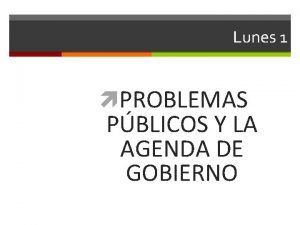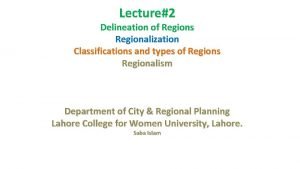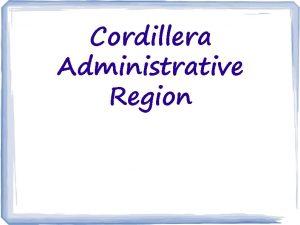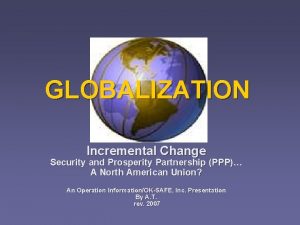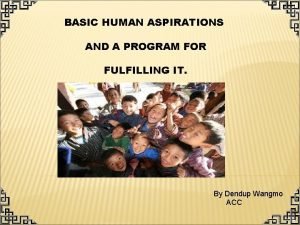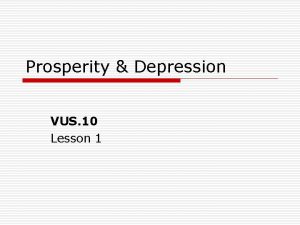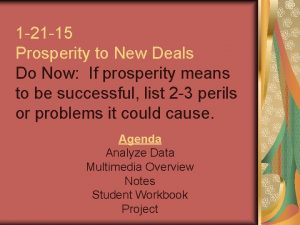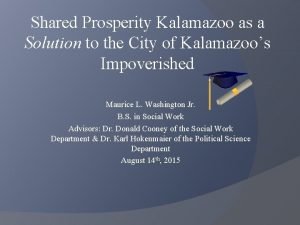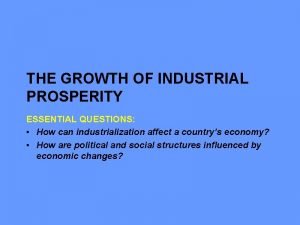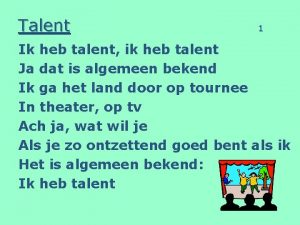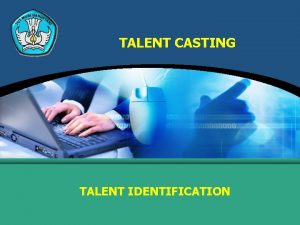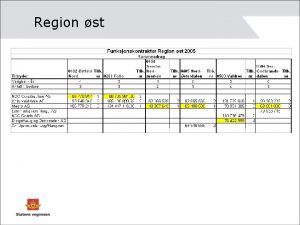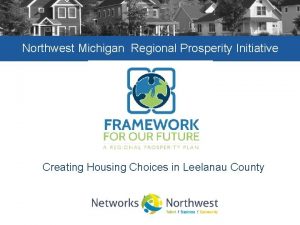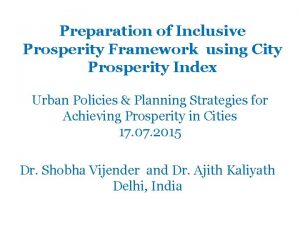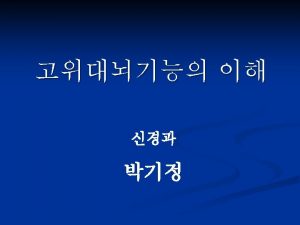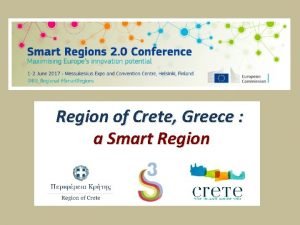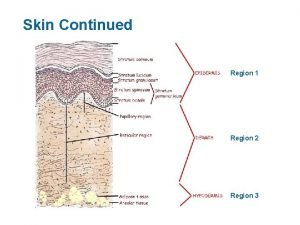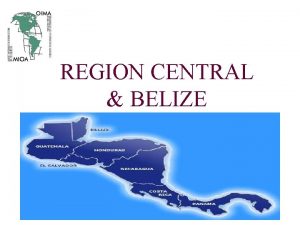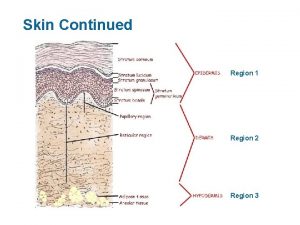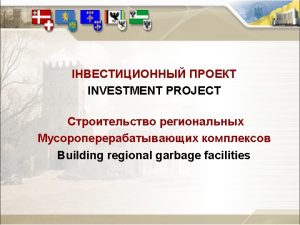Region 9 Regional Prosperity Initiative Talent Council Agenda




















- Slides: 20

Region 9 Regional Prosperity Initiative Talent Council

Agenda Welcome and Introductions Meeting Overview Sneak peak – regional data Updates and discussion: • • RPI 2 nd Round Funding Proposal Adult Education Workforce Alignment Industry Clusters Talent Council Workgroups: • Break Out • Prioritize Goals and Strategies

3 Q job region 9 job demand snap shot

3 Q Region 9 Job Demand Snapshot

Employment & labor force 5

2 nd Round Funding Proposal Build a Sustainable Regional Collaborative Framework • Convene regional stakeholders and business, political, and philanthropic leaders, for a one-day summit; • Establish an action plan for implementing a selected regional prosperity collaborative structure and the five-year prosperity strategy; • Develop collaborative solutions for, one or two highpriority and potentially game-changing economic development projects in the region using a “SWAT team” approach.

2 nd Round Funding Proposal Expand on the Success of the Functional Teams • Organize and formalize Regional Prosperity Council • Create and align a Region 9 Talent District Career Council, with a Regional Prosperity Initiative Talent Council; • Identify necessary adult education services and protocols to consolidate, and initiate adult education system changes; • Agree on how to align and possibly merge Michigan Works! operations and begin the transition process; • Evaluate regions current transportation infrastructure; • Establish a challenge grant program to support the functional teams’ early implementation of some of the most strongly supported and timely strategies.

Adult Education Work Group • Charge: Develop a regional strategy to increase success along career pathways for learners starting with basic skills gaps that improves access to and results from adult education in Region 9. • Vehicle for Action: WISD’s January 2015 procurement of adult education providers (Section 107 of the School Aid Act). • Who is Involved: More than 30 people meeting monthly– adult education program directors, K-12 & ISD leaders, Michigan Works! Agencies, WCC, literacy council • Issues being Worked Through: Solving geographic gaps, agreeing on metrics and best practice design, identifying innovation opportunity.

Workforce Development Work Group • • • Charge: Determine whether/how to consolidate and/or better coordinate workforce services and governance within Region 9. Who is Involved: Committees from 3 of 4 workforce boards in region have begun to meet to explore options. The 4 MWA directors are also meeting regularly about this. Issues being Worked Through: Thinking through service delivery redesign options and governance options and timelines. Considering range of approaches, and what makes sense to do regionally vs. locally.

Industry cluster updates IT Employer engagement Advanced Health care manufacturing TDL?

Information technology Company culture: employer of choice models Soft skills: communication, team work, collaboration in the work place Hard to fill positions: solving today’s talent gaps in high demand areas Skills gap: addressing longer-term talent pipeline issues Talent attraction/retention: promoting the area as a regional IT hub

Health care Skills gap: addressing longer-term talent pipeline issues (K-12 pathways and career pipelines) Leadership development/succession planning (especially in long term care) Talent matching: pre-screening strategies to improve recruit-to-hire ratios Understanding talent supply: creation of a health care workforce database to better understand health care workforce supply issues, including expected retirement levels in highly specific occupation categories Talent attraction/retention: compact licensure for nursing (policy)

Manufacturing

Career awareness workgroup • Career Awareness Campaign – Targets Community and Employer Audiences – Identify and expand on existing career awareness activities – Partner with employers to ID skill gaps and employment opportunities – Educate teachers, counselors, parents, students about high demand jobs – Develop consistent messaging that can be used throughout region – Use Social Media to reach out to younger people and promote high demand jobs • Develop Experiential Learning Opportunities – Provide more context, real work applications for students – Educate and engage employers on benefits of partnering with schools – Educate and assist with development of internships – Engage students early, using a variety of creative learning methods – Explore using ccinspire tool to support experiential learning pathways – Assess students throughout to guide career development (improve education development planning processes) – Post career awareness best practices on Region 9 website • Build on College Access Networks – Inform students in middle school or earlier about opportunities

Curriculum alignment workgroup • Develop Regional Employer Engagement Strategies – – – • Develop Common Career Pathways – – – • Develop a common regional approach Collect and share similar data from employer advisory groups Explore regional employer “advisory board” council(s) Develop common pathways using CLASP framework Explore transitioning to competency based education and assessment Research policies that facilitate development of common competencies Build on Middle College Model – – – Share and utilize best practices Expand number of schools / ISDs w/ middle colleges Encourage agreements that allow stackable credentials and dual enrollments Embed structured pathways into middle colleges Explore convening regional ISD meetings (aka Wayne RESA)

Special populations • Improve Access to Transportation – – Identify available resources and current gaps in services Work w/ MDOT to access funds for region Apply for federal funding and request waivers (e. g. crossing county lines) Develop partnerships with private providers • Educate and Engage Employers – – – – – Inform about benefits / incentives to hiring special populations Educate about realistic expectations re. wages, barriers, obligations Develop partnerships with employers who hire and provide supports Encourage supportive employers to reach out to others Identify training and employment needs (esp. for entry level positions) Help employers to easily find people who match their employment needs Provide support services that assist special populations after hiring Explore partnering w/ MEDC’s re. Community Ventures in region, etc… Explore creating Employer Resource Networks or Service Providers Networks

Special populations, cont’d • Provide Career Readiness and Job Placement Services – – – – – • Educate job seekers about the job market and work expectations Identify available resources and gaps in services Plan to make sure services available throughout region Remove silos and coordinate service delivery Explore viability of using common assessments and readiness certifications Identify and help address barriers to employment Train job seekers for the skills employers need Train job seekers in life skills / employability skills… Help develop strong job search skills and assist with placement Provide support services and training (e. g. technology) after employment Advocate to Address Systemic Issues – – Advocate for access to mental health, housing, substance abuse treatment… Advocate for funding for outreach, training and support services

Talent attraction and retention • Develop healthy and effective 2 -way relationships with employers – – – – • • Educate employers about availability of talent Provide assistance with recruitment Develop guidelines for partnering to meet employer needs Develop a scorecard to help employers improve hiring practices Provide employer benchmarks (look at ASE) re. “employer of choice” Develop a rapid response process Coordinate stakeholder activities Inform job seekers about the region and jobs opportunities – Develop registries to help job placement. – – – Pilot a Linked In Student Outreach Project Help workers eliminate barriers (e. g. spousal employment, licensure issues) Educate students about jobs and where to get training Continue to develop process for attracting and job matching foreign nationals

Break out activity • • Each table is assigned 2 workgroups to give input on. At tables, discuss which goals and strategies are the most important and achievable, and identify any other possible strategies. If time, a person from each table will report out some of the most important goals and strategies identified at their table. Each person rank the top 5 strategies and write down any additional thoughts or ideas on their feedback forms.

Save the date: 12/17/14 WEBSITE: win-semich. org EMAIL: Lisa. Katz@win-semich. org Thank You!
 Flint hills regional council
Flint hills regional council Central highlands regional council tenders
Central highlands regional council tenders Agenda sistemica y agenda institucional
Agenda sistemica y agenda institucional Student council meeting agenda
Student council meeting agenda Types of regions
Types of regions Dangdang ay history
Dangdang ay history Centre region council of governments
Centre region council of governments Muscles of the scapular region
Muscles of the scapular region Active region and saturation region
Active region and saturation region Mexiplex
Mexiplex What are basic human aspirations?
What are basic human aspirations? Prosperity and depression worksheet answers
Prosperity and depression worksheet answers Prosperity deals
Prosperity deals Epsrc prosperity partnerships
Epsrc prosperity partnerships Prosperity oil
Prosperity oil Phases of a business cycle
Phases of a business cycle Shared prosperity kalamazoo
Shared prosperity kalamazoo The growth of industrial prosperity
The growth of industrial prosperity People planet prosperity
People planet prosperity The four laws of financial prosperity
The four laws of financial prosperity Chapter 14 postwar prosperity and civil rights
Chapter 14 postwar prosperity and civil rights
